人教版(2019)必修第一册Unit 5 Languages around the world Listening and Speaking课件 (共18张PPT,内镶嵌视频和音频)
文档属性
| 名称 | 人教版(2019)必修第一册Unit 5 Languages around the world Listening and Speaking课件 (共18张PPT,内镶嵌视频和音频) |
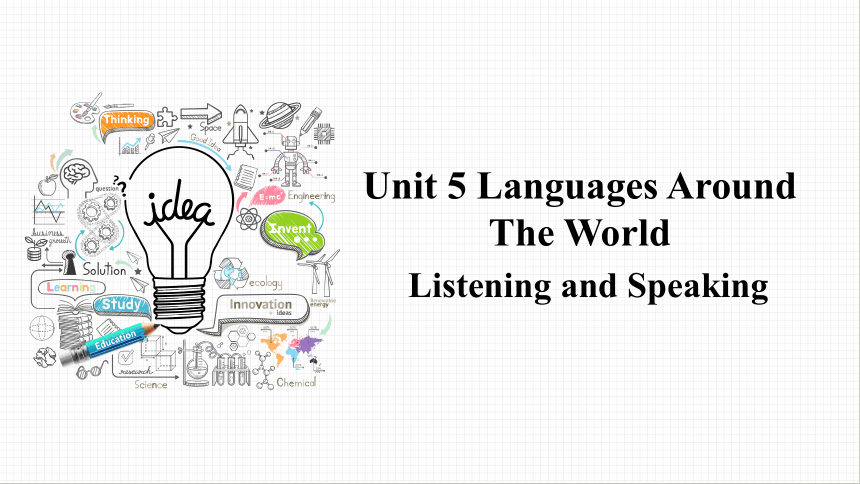
|
|
| 格式 | pptx | ||
| 文件大小 | 22.8MB | ||
| 资源类型 | 教案 | ||
| 版本资源 | 人教版(2019) | ||
| 科目 | 英语 | ||
| 更新时间 | 2024-10-09 11:12:24 | ||
图片预览

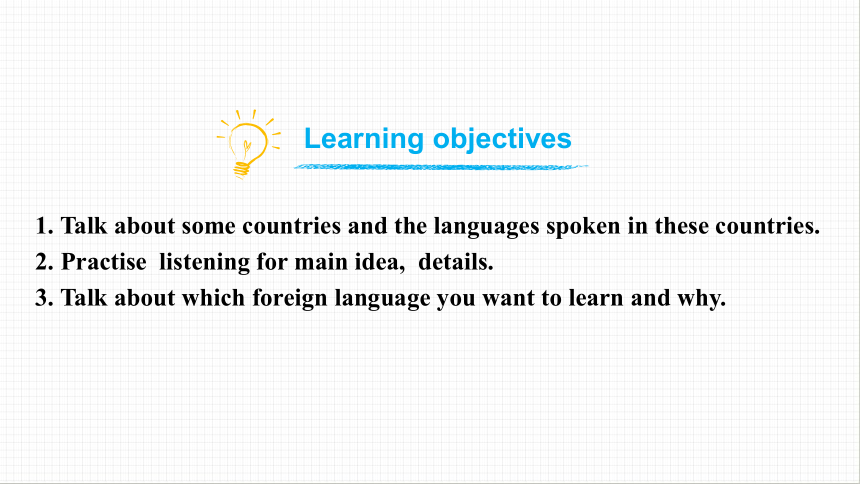

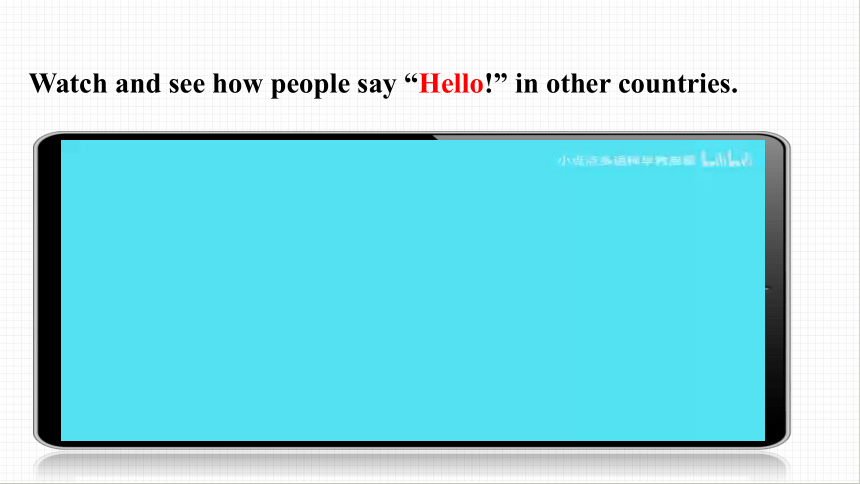
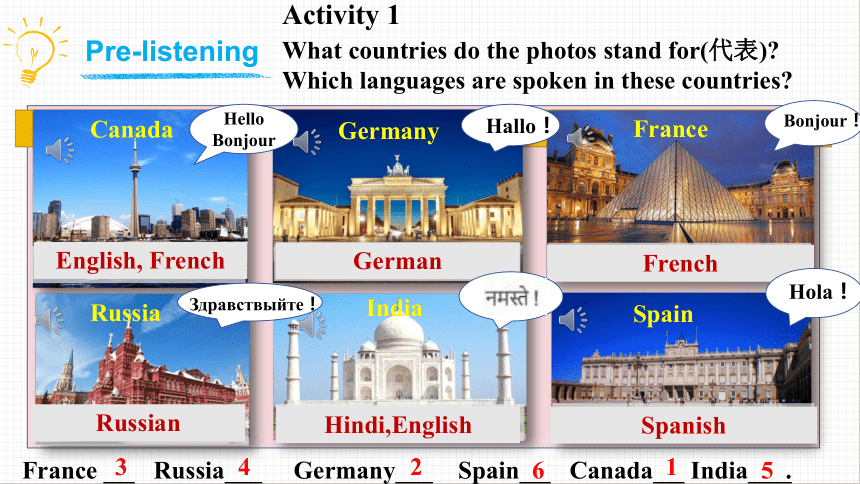
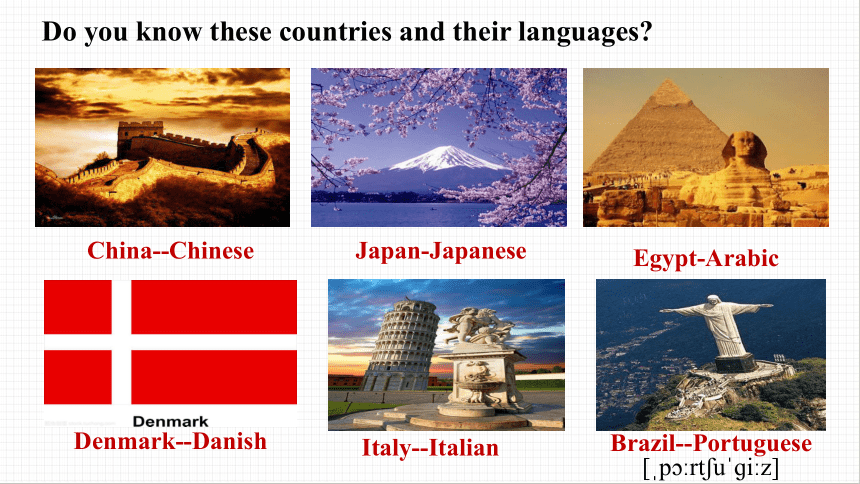
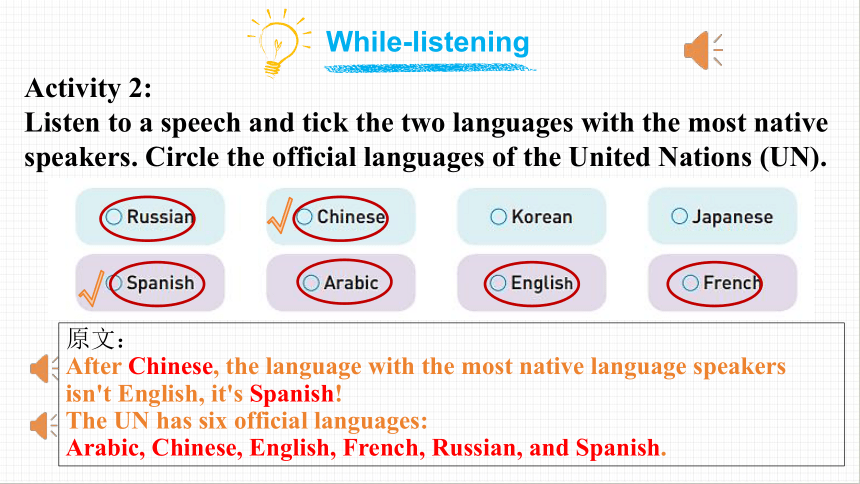
文档简介
(共18张PPT)
Listening and Speaking
Unit 5 Languages Around The World
1. Talk about some countries and the languages spoken in these countries.
2. Practise listening for main idea, details.
3. Talk about which foreign language you want to learn and why.
Learning objectives
Look and discuss:
Do you know where the photo was taken?
UN General Assembly meeting(联合国大会)
Which language do you think are officially used here (Tips: 6种)
Chinese, English, Russian, French, Spanish, Arabic
One language sets you in a corridor for life. Two languages open every door along the way. ——Frank Smith
一门语言能带你进入人生旅途,两门语言则为你开启人生旅途中的所有大门。
Lead-in
Watch and see how people say “Hello!” in other countries.
The CN Tower
Brandenburg Gate
Red Square
Taj Mahal
Louvre Museum
Palace of Madrid
Canada
English, French
Germany
German
France
French
Russia
Russian
India
Hindi,English
Spain
Spanish
Hello
Bonjour
Hallo!
Bonjour!
Здравствыйте!
Hola!
What countries do the photos stand for(代表)
Which languages are spoken in these countries
France Russia Germany Spain Canada India .
3
6
4
2
1
5
Activity 1
Pre-listening
Japan-Japanese
China--Chinese
Egypt-Arabic
Denmark--Danish
Brazil--Portuguese
[ p rt u ɡi z]
Italy--Italian
Do you know these countries and their languages
原文:
After Chinese, the language with the most native language speakers isn't English, it's Spanish!
The UN has six official languages:
Arabic, Chinese, English, French, Russian, and Spanish.
Activity 2:
Listen to a speech and tick the two languages with the most native speakers. Circle the official languages of the United Nations (UN).
√
√
While-listening
1. What is the main topic of this speech?
A. Learning a foreign language.
B. Introduce languages over the world.
2. How many languages are there in the world?
________________
3. How many billion people speak the UN's official as their native or second language?________________
4. What is the attitude of the speaker towards foreign language learning
A. Positive B. Doubtful(怀疑的)
Activity 3 Listen to the speech again and answer the questions.
√
√
4原文:Learning English is very useful, but it is wise to learn at least one other foreign language, if possible.
7,000.
2.8 billion.
Students Language(s) they choose Reasons
many students One of the languages that are spoken at _______ better ___________
an American girl _______ Her _____________ were from Denmark.
another young lady _______ She had _______ from ___________
the UN
job chances
Danish
French
grandparents
friends
French spoken countries
Why do you learn English
job
family
friends
Activity 4 Listen again and sum up the reasons.
1 They think it means better job
chances in the future.
They: students who choose to study
a UN language.
it: studying a UN language.
They: the six official UN languages.
Reference
Pronouns (it, they, she, etc.)
refer to something or somebody mentioned earlier. Pay attention to the context of words to help you understand what the pronouns refer to.
Activity 5: Listen to the speech again. What do the italicised words refer to in the sentences
原文:Many students choose to study one of the languages that are spoken at the UN. As they think it means better job chances in the future.
2 They are spoken by around 2.8 billion people ...
To some students, it seems that the only foreign language to learn is English. There are, however, nearly 7,000 languages in the world. After Chinese, the language with the most native language speakers isn't English, it's Spanish! Learning English is very useful, but it is wise to learn at least one other foreign language, if possible.
There are many reasons why people learn a foreign language. Many students choose to study one of the languages that are spoken at the UN. As they think it means better job chances in the future. The UN has six official languages: Arabic, Chinese, English, French, Russian, and Spanish. They are spoken by around 2.8 billion people as their native or second languages.
Some students, though, choose to study a language because of family or friends. One American girl chose to learn Danish because her grandparents were from Denmark. When she was little, her grandpa used to read letters to her in Danish from their relatives in Denmark. Another young lady started learning French because she had several friends from African countries where French is spoken.
What do you think Which other language would you choose to study and why
Think about other language(s) you want to learn and why.
My father is doing business with Russians. I’d like to learn Russian so I can help him in the future.
Perhaps I should study French. I think it sounds beautiful, and I know it’s used in many countries.
I like watching Japanese cartoons, so I’d like to learn Japanese.
Family
Personal interest
Personal development
Post-listening
EXAMPLE
A: What language do you want to study
B: I really want to study French. I think that the French language sounds beautiful.
A: Why Do you want to go to France some day
B: Yes, I’ d love to. Also, French is used by many international organisations around the world. Do you know that FIFA’ s full name is in French
A: Oh, I remember that. But I don’ t know how to pronounce it.
Work in pairs or groups.
Discuss which other language(s) you want to learn and why.
A: What language do you want to study
B: I really want to study .
I think that (俄语很有用).
A: Why
B: My father
A:Sunds great. .
(俄语很难学)
Work in pairs or groups and fill in the blanks.
Discuss which other language(s) you want to learn and why.
Show time
Russian
Russian is useful
But I think Russian is hard to learn
is doing business with Russians.
I’d like to learn Russian so I can help him
in the future.
1.Work in pairs. Read the words to each other and see if you pronounce them differently.
Pronunciation
Listen and pay attention to how the speakers pronounce them.
word 英音 美音
schedule / edju l/ / sked u l/
hostile / h sta l/ / hɑ stl, hɑ sta l/
either / a (r), i (r)/ / i r, a r/
address / dres/ / dres/
direct /di rekt, da rekt/ /da rekt, di rekt/
laboratory /l b r tri/ / l br t ri/
advertisement / d v t sm nt/ / dv r ta zm nt/
shone / n/ / ɑ n, n/
English is a crazy language.
There is no egg in eggplant nor ham in hamburger; neither apple nor pine in pineapple. English muffins weren’t invested in England or French fires in France. Sweetmeats are candies while sweetbreads, which aren’t sweet, are meat.
… We find that quicksand can work slowly, boxing rings are square, and a guinea pig is neither from Guinea nor is it a pig. And why is it that writers write but…hammers don’t ham (Richard Lederer)
BrE: (woman)
AmE: (man)
2.Listen to the paragraph read by two different speakers. Which speaker has a British accent and which has an American accent
Summarize the expressions for languages around the world and review the differences between British accents and American accents.
Homework
Listening and Speaking
Unit 5 Languages Around The World
1. Talk about some countries and the languages spoken in these countries.
2. Practise listening for main idea, details.
3. Talk about which foreign language you want to learn and why.
Learning objectives
Look and discuss:
Do you know where the photo was taken?
UN General Assembly meeting(联合国大会)
Which language do you think are officially used here (Tips: 6种)
Chinese, English, Russian, French, Spanish, Arabic
One language sets you in a corridor for life. Two languages open every door along the way. ——Frank Smith
一门语言能带你进入人生旅途,两门语言则为你开启人生旅途中的所有大门。
Lead-in
Watch and see how people say “Hello!” in other countries.
The CN Tower
Brandenburg Gate
Red Square
Taj Mahal
Louvre Museum
Palace of Madrid
Canada
English, French
Germany
German
France
French
Russia
Russian
India
Hindi,English
Spain
Spanish
Hello
Bonjour
Hallo!
Bonjour!
Здравствыйте!
Hola!
What countries do the photos stand for(代表)
Which languages are spoken in these countries
France Russia Germany Spain Canada India .
3
6
4
2
1
5
Activity 1
Pre-listening
Japan-Japanese
China--Chinese
Egypt-Arabic
Denmark--Danish
Brazil--Portuguese
[ p rt u ɡi z]
Italy--Italian
Do you know these countries and their languages
原文:
After Chinese, the language with the most native language speakers isn't English, it's Spanish!
The UN has six official languages:
Arabic, Chinese, English, French, Russian, and Spanish.
Activity 2:
Listen to a speech and tick the two languages with the most native speakers. Circle the official languages of the United Nations (UN).
√
√
While-listening
1. What is the main topic of this speech?
A. Learning a foreign language.
B. Introduce languages over the world.
2. How many languages are there in the world?
________________
3. How many billion people speak the UN's official as their native or second language?________________
4. What is the attitude of the speaker towards foreign language learning
A. Positive B. Doubtful(怀疑的)
Activity 3 Listen to the speech again and answer the questions.
√
√
4原文:Learning English is very useful, but it is wise to learn at least one other foreign language, if possible.
7,000.
2.8 billion.
Students Language(s) they choose Reasons
many students One of the languages that are spoken at _______ better ___________
an American girl _______ Her _____________ were from Denmark.
another young lady _______ She had _______ from ___________
the UN
job chances
Danish
French
grandparents
friends
French spoken countries
Why do you learn English
job
family
friends
Activity 4 Listen again and sum up the reasons.
1 They think it means better job
chances in the future.
They: students who choose to study
a UN language.
it: studying a UN language.
They: the six official UN languages.
Reference
Pronouns (it, they, she, etc.)
refer to something or somebody mentioned earlier. Pay attention to the context of words to help you understand what the pronouns refer to.
Activity 5: Listen to the speech again. What do the italicised words refer to in the sentences
原文:Many students choose to study one of the languages that are spoken at the UN. As they think it means better job chances in the future.
2 They are spoken by around 2.8 billion people ...
To some students, it seems that the only foreign language to learn is English. There are, however, nearly 7,000 languages in the world. After Chinese, the language with the most native language speakers isn't English, it's Spanish! Learning English is very useful, but it is wise to learn at least one other foreign language, if possible.
There are many reasons why people learn a foreign language. Many students choose to study one of the languages that are spoken at the UN. As they think it means better job chances in the future. The UN has six official languages: Arabic, Chinese, English, French, Russian, and Spanish. They are spoken by around 2.8 billion people as their native or second languages.
Some students, though, choose to study a language because of family or friends. One American girl chose to learn Danish because her grandparents were from Denmark. When she was little, her grandpa used to read letters to her in Danish from their relatives in Denmark. Another young lady started learning French because she had several friends from African countries where French is spoken.
What do you think Which other language would you choose to study and why
Think about other language(s) you want to learn and why.
My father is doing business with Russians. I’d like to learn Russian so I can help him in the future.
Perhaps I should study French. I think it sounds beautiful, and I know it’s used in many countries.
I like watching Japanese cartoons, so I’d like to learn Japanese.
Family
Personal interest
Personal development
Post-listening
EXAMPLE
A: What language do you want to study
B: I really want to study French. I think that the French language sounds beautiful.
A: Why Do you want to go to France some day
B: Yes, I’ d love to. Also, French is used by many international organisations around the world. Do you know that FIFA’ s full name is in French
A: Oh, I remember that. But I don’ t know how to pronounce it.
Work in pairs or groups.
Discuss which other language(s) you want to learn and why.
A: What language do you want to study
B: I really want to study .
I think that (俄语很有用).
A: Why
B: My father
A:Sunds great. .
(俄语很难学)
Work in pairs or groups and fill in the blanks.
Discuss which other language(s) you want to learn and why.
Show time
Russian
Russian is useful
But I think Russian is hard to learn
is doing business with Russians.
I’d like to learn Russian so I can help him
in the future.
1.Work in pairs. Read the words to each other and see if you pronounce them differently.
Pronunciation
Listen and pay attention to how the speakers pronounce them.
word 英音 美音
schedule / edju l/ / sked u l/
hostile / h sta l/ / hɑ stl, hɑ sta l/
either / a (r), i (r)/ / i r, a r/
address / dres/ / dres/
direct /di rekt, da rekt/ /da rekt, di rekt/
laboratory /l b r tri/ / l br t ri/
advertisement / d v t sm nt/ / dv r ta zm nt/
shone / n/ / ɑ n, n/
English is a crazy language.
There is no egg in eggplant nor ham in hamburger; neither apple nor pine in pineapple. English muffins weren’t invested in England or French fires in France. Sweetmeats are candies while sweetbreads, which aren’t sweet, are meat.
… We find that quicksand can work slowly, boxing rings are square, and a guinea pig is neither from Guinea nor is it a pig. And why is it that writers write but…hammers don’t ham (Richard Lederer)
BrE: (woman)
AmE: (man)
2.Listen to the paragraph read by two different speakers. Which speaker has a British accent and which has an American accent
Summarize the expressions for languages around the world and review the differences between British accents and American accents.
Homework
